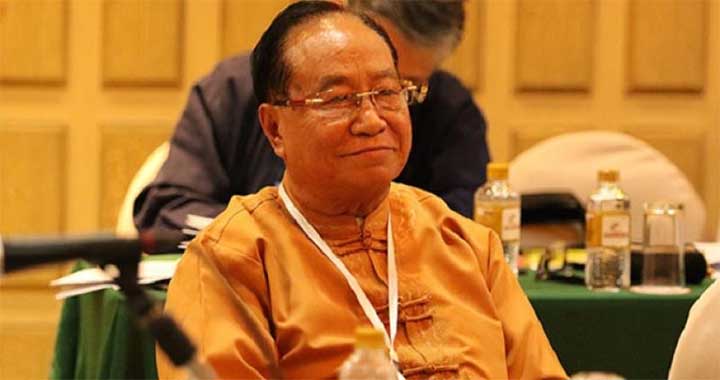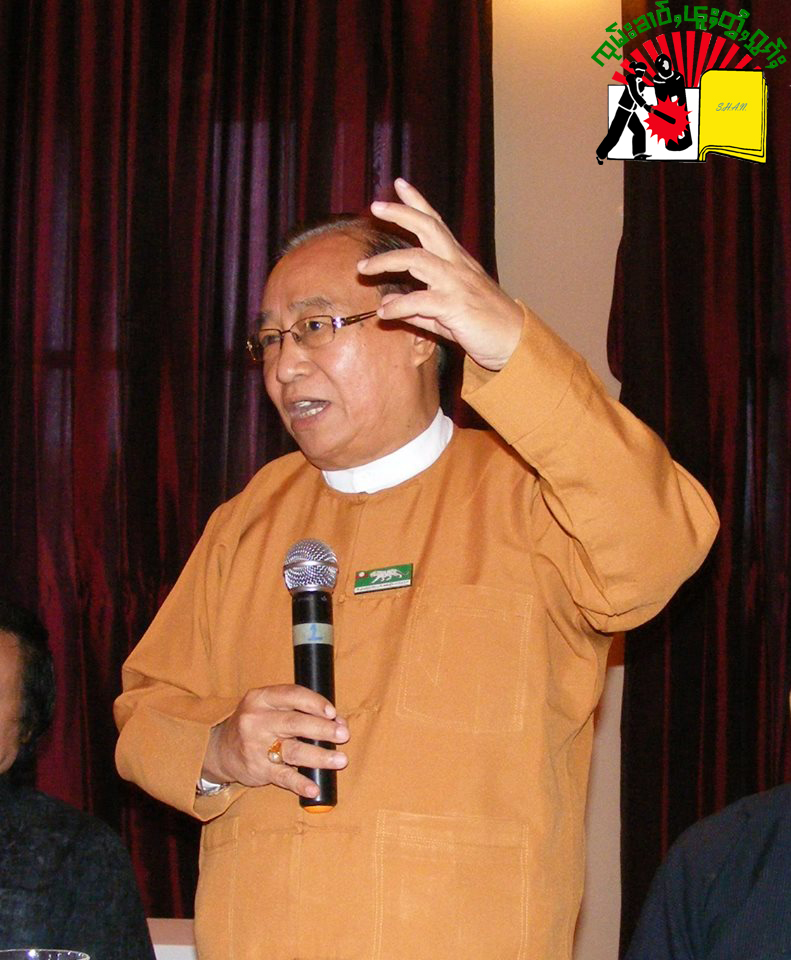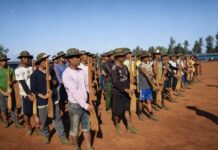Life mission of SNDP chairman Sai Aik Pao

Sai Aik Pao has been deliberately trying to stage a political comeback, ever since his party Shan Nationalities Democratic Party (SNDP) was ousted and replaced by the rival Shan Nationalities League for Democracy (SNLD) in the nationwide general election of November 2015, by trying to champion the Shan unity which is in jeopardy, due to the fighting between the Restoration Council of Shan State/Shan State Army (RCSS/SSA) and the Shan State Progress Party (SSPP/SSA).
Biographical sketch
Born in March 1946, he is son of Loong Yi Saw (father) and Pa Kam Soi (mother) both deceased. He is married to Pa Nang Sein and have three sons and a daughter, who are all in salt manufacturing business owned by him. He is the founder and chairman of the SNDP, known as white tiger according to the party’s logo.
He has Bachelor degree majoring in geography, is a higher grade pleader and a registered lawyer. He was an MP for No. 2 Hsenwi township and cabinet member of the Shan State government until 2005 serving as the minister of mining.
He was general secretary of Taunggyi Association in Yangon from 1986 to 1989; active as a patron in Shan Literature and Culture in Yangon and still plays a leading role as chairman in Muse and Nam Kham area in northern Shan state, where he originated.
From 1994 to 1996 he attended the National Convention in the capacity of the general secretary of SNLD, but resigned from the position in 1996.
By the year 2000 he resigned from the SNLD. In 2005, the SNLD party leadership was imprisoned by the military government, and remained so until 2012. This prohibited the SNLD from competing in Burma’s 2010 elections. In 2010, the SNDP officially registered as a political party.
His party, which had achieved 57 seats in 2010 election and another one seat in 2012 by-election, did very well becoming the second biggest party in Shan State and in National Parliament after the Union Solidarity and Development Party (USDP). But did so poorly in 2015 election that it only won one seat in Shan State Parliament, while its former party and rival SNLD won almost all seats previously occupied by the SNDP.
He was chairman of the salt manufacturing in Yangon fro 2000 to 2006 and also traveled to attend the UNICEF held conference in 2000 for salt manufacturers association in The Hague, in The Netherlands, including the study tours to Germany and Belgium. In 2005, he also attended the conference held in Beijing, China.
The SNLD in the 2015 election, won 3 seats in the Amyotha Hluttaw (Parliament), 12 seats in the Pyithu Hluttaw and 24 in the Shan State Hluttaw, and 1 in the Kachin State Hluttaw. It again won another additional seats in Pyithu Hluttaw 2 and Shan State Hluttaw 4, totaling 6 seats in 2017 by-election. Thus increasing its 40 seats to 46 overall in various Parliaments.
In 1990 election, in which the National League for Democracy (NLD) won the most vote, the SNLD came up second nationally and first in Shan State. But the winning parties were not allowed to form government as the military regime insisted upon the drafting of the constitution first to its liking, lasting decades before it was approved in 2008.
Problems with the unification
As recently as last month Sai Aik Pao said that he wanted to see the merger of the two Shan political parties before he died, while he was trying to be a mediator for the two Shan warring armies, the RCSS and the SSPP that are fighting each other due to territorial dispute.
In the capacity of the Committee for Shan State Unity (CSSU) rotational chairman, who is due to resign sometime next month in February, he was asked by SHAN on whether he is satisfied with his performance as a chairman, he replied: “I am not satisfied with the one-year chairmanship term. I have repeatedly tried to implement the demands of Shan Sangha [monks] and Shan people regarding the merging of the two Shan armed forces and two Shan political parties. Unfortunately, I failed. Nothing is successful. Even though a Shan political party won [seats] in the general elections, Shan people have not been able to depend on them. That’s why I am not satisfied with the results of this year.”
He further stressed that nothing has been achieved even though he has tried, as there is no unity, especially among the CSSU members. He pinpointed the fact saying: “If we won’t work for unity among the Shan people and if there is war and fighting, Shan youth will have tremendous difficulties in the future.”
Regarding the CSSU’s future plan he said: “My term is over next month [in February]. We have not discussed who is going to take the over the chairmanship role after me. It’s better to have collective leadership among us. It will be easier to work together.”
He made it clear that 70 years of war has denied the people of Shan State the needed achievement and development as well.
He said: “All people in Shan State must participate in it (CSSU). It is not only for Shan people—it’s for all people living in Shan State. If the Shan people don’t have unity, it will be difficult to build unity with other ethnic people.”
Concerning unity he said. “Neither the two Shan political parties nor the two Shan armed forces have unity. I want to request that the two Shan armed forces avoid clashes.”
The organization includes: Shan State Joint Action Committee (a coalition of SNLD, SSPP/SSA, and Shan State Militia Force); SNDP; RCSS/SSA; Shan Community Based Organizations; Tai Youth Organization; Shan Lawyers Network; New Generation Shan State; Tai National Association Thailand; Eastern Shan State Development and Democratic Party (ESSDDP); and Tai Youth Network (TYN).
It was formed in 2013 under the leadership of RCSS/SSA leader Gen Yawd Serk. Its objectives are to protect the rights of the Shan people, to pursue self-determination of the Shan people, and to draft a framework for political dialogue.
Unfulfilled dreams
Sai Aik Pao mission in life seems to be to form a Shan State government and work for the welfare of the people. But the SNLD has nullified his ambition by replacing his party in Shan political arena through the 2015 elections. And to fulfill this he knows that the fusion of the two Shan political parties is the only way.
On the eve of 2015 election, with full optimism and enthusiasm, he outlined his ambition as: “It is very important. There has never been a truly Shan party competing in an election after Burma’s independence.”
He went on to explain: “There are 330 townships in Burma and the SNDP is competing in 68 townships. This election will change the fate of the Shan people. The more seats the SNDP wins, the better off Shan people will be. Please vote for the SNDP because the SNDP is a true Shan party; the chairman of the SNDP is Shan, the vice-chairman is also Shan. We are Shan-born families. We are 100 percent Shan. Therefore, we will [work] for our Shan people including those who are in Kachin State, Sagaing Division, Kayah State and Mandalay Division. If we don’t have power, we cannot do anything. Therefore, we need power.”
And as for what he will do for the people if he won, he said: “This is very good question. I really want to answer this. Shan people have been through difficult [times]. Because of the uncertainty in the country, over one million Shan people have migrated to Thailand. I want to do many things for them. But first, there has to be peace in our country. What we want to do for our people economically, is, for example—we need to develop better agriculture outputs, roads, electricity, healthcare and education.”
He elaborated; “The big problem in Shan State is land confiscation. [Most] Shan people are farmers and most of their lands are seized by the military. The first thing I will do if SNDP become Shan State’s government is to find jobs for them. We will focus on agriculture. I have learned many things from Thailand about agriculture. We will provide education about agriculture to the people of Shan State.”
Since 2012, the Shan people have been urging the two parties to enter the election as a combined party and concerned stakeholders have also been trying without success until today. And to make the matter worse, the two Shan armies are bogged down in open warfare, due to territorial dispute, at the cost of the Shan people starting last July.
The difficulties that the parties could not go further with the fusion is due to the ideology differences.
Sai Aik Pao confirmed in September 2015 in a media interview that: “Our main differences are in political policy. They want a federal Union with eight states, whereas we accept the status quo of seven regions and seven states, as laid out under the present constitution. That’s the main difference between us.”

The last hurrah
For now, it is not clear if his deliberation as a mediator will pay off and the warring Shan armies will come to sense and end the conflict that will give him a due political credit as a Shan patriot and real doer who could actually deliver. Additionally, no one can also foresee if his plea that the two Shan political parties, the SNDP that he himself lead and the SNLD, merger will materialize anytime soon, so that his professed life mission could be accomplished.
We could only wish his seemingly last hurrah effort will be met with a positive response and affirmative outcome.











Leave a Comments